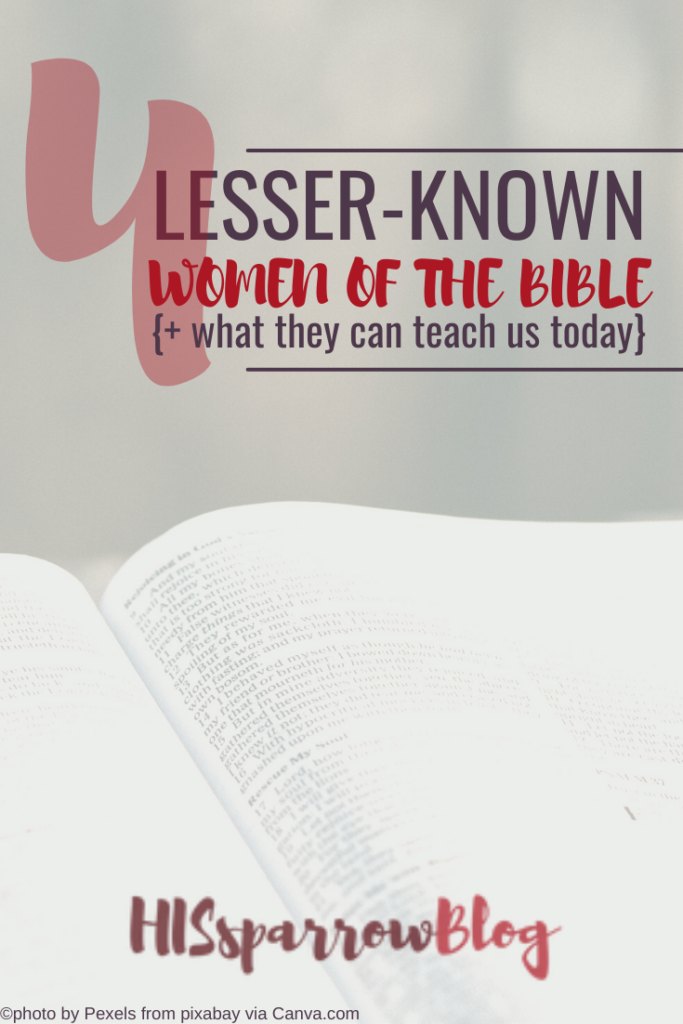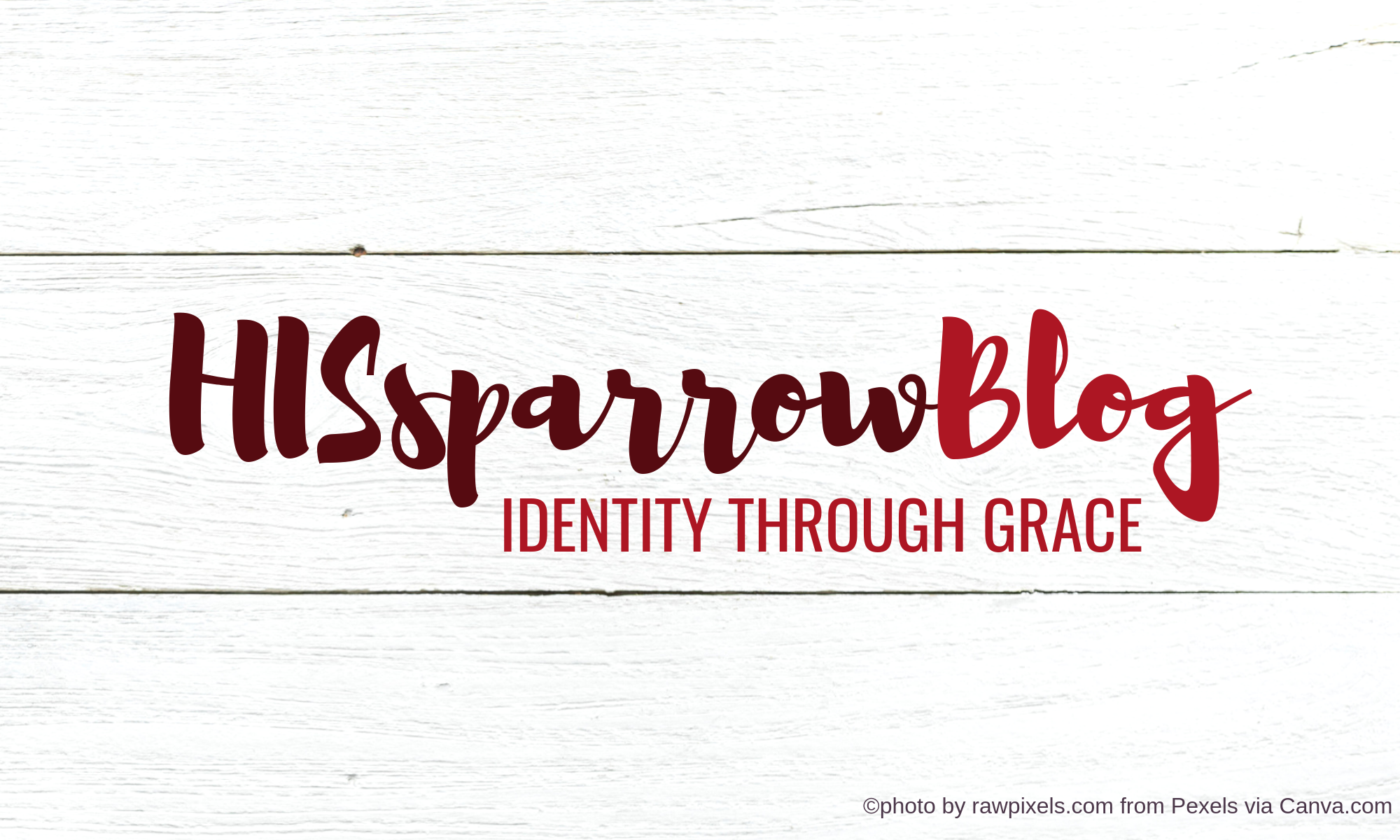Do you ever feel unseen or underappreciated? We’ll talk about a few lesser-known women in the Bible and what they can teach us about that today.
What if I asked you to name a person from the Bible? Our answers would probably be similar; we’d go to the “main characters”—like David, Abraham, Moses, Esther, Paul, Ruth…
These are all wonderful people to study. We like to look at them and see ourselves in their triumphs and even shortcomings. They can teach us so much today even though our lives look drastically different than theirs did thousands of years ago.
But then sometimes in our day-to-day lives, in the struggles, we can feel unseen and underappreciated. More like those in the Bible who are not as well-known.
Today I’d like to look at several of those lesser-known women in the Bible: Jehosheba, Abigail, Lois, and Eunice. You may not even recognize their names right off, which makes them perfect to discuss today.

Jehosheba
Jehosheba was the aunt of the boy-king Josiah and the daughter of King Jehoram and Athialiah.
She had quite the parentage. On her mother’s side, she was the granddaughter to arguably the most wicked king and queen of Israel, Ahab and Jezebel. On her father’s side, she was the granddaughter of King Jehosophat, who was counted as a godly king. She was also wife to the high priest of Jerusalem at the time.
As a princess of Judah, she had an impressive pedigree, and I’m guessing she was accustomed to a certain level of pampering. I don’t know what her day-to-day life was like, since the Bible doesn’t mention it, but it does say that she didn’t lounge on her couch when it counted.
The legacy of her grandparents Ahab and Jezebel had far-reaching effects in both Israel and Judah. King Jehoram, Jehosheba’s father, followed in the ways of the house of Ahab as did his son King Ahaziah, Jehosheba’s brother, who was killed when God’s prophecy to end the house of Ahab came to fruition.
At the death of her son, Athialiah, Jehosheba’s mother, took the opportunity to step into power and eliminate any competition to her rule—and the line of Judah—by killing the princes.
We can’t know the details of what happened. Did Jehosheba hear of the edict and immediately find her nephew and his nurse? Or were there soldiers stomping the halls of the palace, swords drawn?
Regardless, she acted quickly to save her nephew, the rightful king of Judah, smuggling him to the temple, so he could be crowned king six years later. Through her courage, the lineage of the Messiah was preserved. Did she know her actions would have such long-term implications? I’m not sure. Perhaps she was just doing what she knew to be right at that moment. Either way we can learn a great deal from her actions.
Abigail
We find Abigail mentioned in the account of David in 1 Samuel, so it’s no wonder that you might not remember her name. David’s story is full of people and events that spanned decades.
Abigail was part of David’s wandering years as he fled the rage of King Saul.
David had become a sort of beacon to those who were distressed under the rule of Saul and was commander of several hundred men. I can imagine that many people gathered in one place could use a lot of provisions, but when David sent messengers in good will to the wealthy local Nabal, the man not only said no but insulted David and his men—even going so far as to say, “Who is this David you speak of? Why should I help him?” And this was after David and his men guarded the man’s sheep and shepherds in the fields, not allowing anyone to harm any of the man’s property.
The Bible doesn’t mention anything beyond that, but in other passages, David’s fame stretched far. In fact, David’s fame was part of the reason that Saul wanted to kill him. The other being, of course, that David was anointed by God to be king following Saul’s reign.
Everyone knew who David was.
David’s response to Nabal’s affront was to gear up for war and kill anyone belonging to Nabal. I’ve often wondered about David’s response. For a man who handled the unjust pursuit from Saul so well and never succumbed to the temptation to hurry the end of Saul’s reign, I’ve always been surprised at his hot-headed response. Perhaps he was tired after living on the run so long or from commanding such a large rag-tag group and this was just the last thing that set him off. Regardless, he and most of his men set off.
Now Nabal had a wife, which is where Abigail comes into the story. The Bible says she was both beautiful and intelligent. And when the servants told her about what had happened with David’s men, she was afraid. Somehow, she knew that Nabal’s foolishness was a danger to everyone present.
So she gathered provisions for David’s men—donkey-load after another—and set off to meet David.
I’ve often wondered at Abigail’s boldness. I think of women in biblical times as living under a strict patriarchal society—where most men viewed women as another form of property. Yet we see Abigail commanding that provisions be gathered after her husband refused and not only did the servants appear to do it happily, but they seemed to have brought the matter to her knowing that she would rectify the situation.
The Bible mentions that Nabal was “surly and mean” in his dealings. But I wonder if perhaps he was also prone to leave some of the business dealings to his wife, considering the servants’ reaction to Abigail and considering that Nabal didn’t miss all these provisions, servants, or even his wife while they were gone to meet David. Instead, he was partying like a king when they returned from saving his life.
Whatever Abigail’s normal routine was, she saved many people by righting a wrong. She was even so bold as to remind David that vengeance was not his to take—it is the Lord’s—and even prophesied that David’s house would be lasting.
Thanks to her quick thinking and action, she was saved, her servants were saved, David was spared the consequences of killing innocent people, and she became David’s wife after Nabal’s death.
Lois and Eunice
These two are only mentioned a couple of times in the whole Bible, one of which was indirectly.
For I am mindful of the sincere faith within you, which first dwelled in your grandmother Lois and your mother Eunice, and I am sure that it is in you as well.
2 Timothy 1:5 NASB
One of my favorite things about these lesser-known women in the Bible is what we learn from them through the legacy of their son/grandson. Timothy was from Lystra, which Paul visited with Barnabas and Mark on his first missionary journey. Perhaps Lois and Eunice came to the faith then.
Paul wrote of Timothy, “my true son in the faith” and “my dear son.” Scripture says that Timothy was the son of a Greek father and Jewish mother, he was strong in the Scriptures since childhood, and he even got circumcised so that nothing interfered with his missionary work. He was described as young with a quiet demeanor. He was spiritually mature for his age.
As I mentioned above, there aren’t many details supplied about Timothy’s mother and grandmother, only that Paul complimented them on their faith that they encouraged in Timothy. These two faithful women can teach us much about living our lives in the small moments each day.
What the Lesser-Known Women in the Bible Can Teach Us Today
#1 – Even a quiet legacy can have a lasting impact.
We may not see the impact of our faith at first, or even in our lifetimes, but it’s there in the small moments, too. I’m sure Lois and Eunice never realized that Timothy would be instrumental in spreading the gospel years after all the little moments that added up to impact a godly man.
We never know what the far-reaching effects of our every-day living will be.
#2 – Courage sometimes isn’t flashy.
The average Christian’s life is in the day-to-day. We aren’t always called to be missionaries in Siberia or Nairobi. There may never be one big way that we get to witness to others, but we can rest assured that even in the seemingly mundane tasks of living, we can have courage to do what we can do.
#3 – God sees us and nothing we do will go unseen with Him.
Although these women were mentioned in Scripture, which really is a wonderful honor, they weren’t the “main characters” of the biblical accounts in which they were recorded. But we can rest assured that God knows them and their every moment, just as he does ours today.
#4 – We are not defined by our pasts, family, or position.
We can make our own choices. Just as Jehosheba looked to the godly teaching of her grandfather Jehoshaphat and ignored the wicked tendencies of her parents, brother, and maternal grandparents, we can move forward in a godly path.
We can feel like these lesser-known women, but the truth is they were listed in the Bible. What an honor that is.
And for us, when we accept Jesus as our Savior, our names are recorded in the Lamb’s Book of Life, and God knows every name in it.
Do you ever feel unseen and underappreciated like those lesser-known in the Bible? Feel free to share what encourages you in the comments below.
Want more reading? Here ya go…
- 10 Lesser-Known Women in the Bible You Should Know from Lisa Appelo
- 2 Reminders For Maintaining Personal Identity in Marriage from HISsparrowBlog
- Identity in Christ: My Name Is… from HISsparrowBlog

I frequently link up with the following: Grace & Truth with Embracing the Unexpected, Tell His Story with Jeanne Takenaka, Let’s Have Coffee with Joanne Viola, and Blessing Bloggers with Deb Wolf.






I love this, Ashley! I was very familiar with Abigail’s story but did not know all the background about Jehosheba. So interesting! And of course, your words about Timothy’s mother and grandmother caught my eye. (I’ve never been a huge fan of my name, but I’m forever grateful my parents chose Lois instead of Eunice when they were picking one out for me!) I love the lessons you drew from these women’s stories.
What? You have a beautiful name, Lois! Thank you for sharing!
I love this study and the principles you drew from it. Abigail is one of my favorite Bible people. It’s an interesting thought that probably none of these women knew they were mentioned in Scripture. Lois and Eunice might have known Paul mentioned them in a letter, but may not have known that letter was Scripture and would be read for thousands of years. Everyday faithfulness has a bigger impact that we know.
Yes, I love Abigail too. We can learn many lessons from her life. Thanks so much for commenting, Barbara!
Johesheba was a new for me! Thank you for opening my eyes to her–along with the lessons you shared from the 4 women. Even a quiet legacy can have impact. That is a thing to be grateful for!
So true, Natalie. I’m so thankful God uses my little. Thanks so much for stopping in!
What a wonderful post! I knew of Abigail, Lois, and Eunice. But … I am not sure I knew Jehosheba. Thank you for sharing the events surrounding her. Thank you for the reminder that even a quieter and lesser known life can have a lasting impact. May we be faithful to the Lord even when we don’t see the influence we may be having on those around us.
Yes, Joanne! May we remember that a quiet life can have a lasting impact too. Thanks so much for commenting!
I appreciate the reminder of Jehosheba’s role !
We all have a place in HIS story!
So true, Michele! Thanks for stopping in!